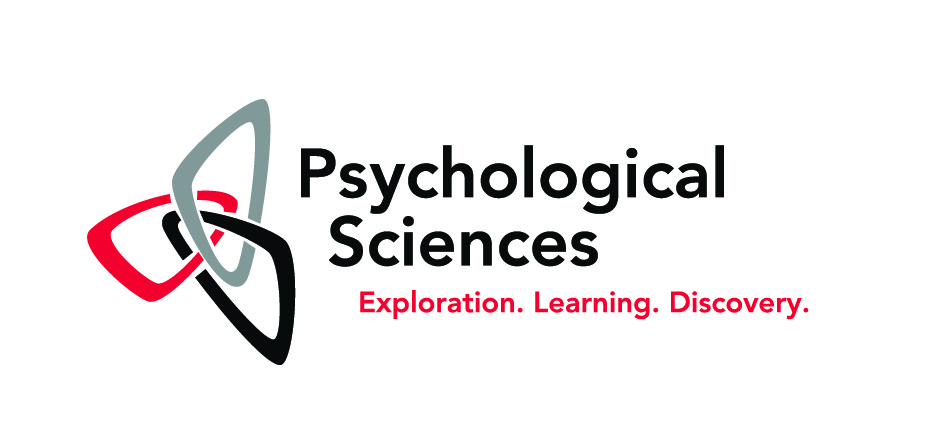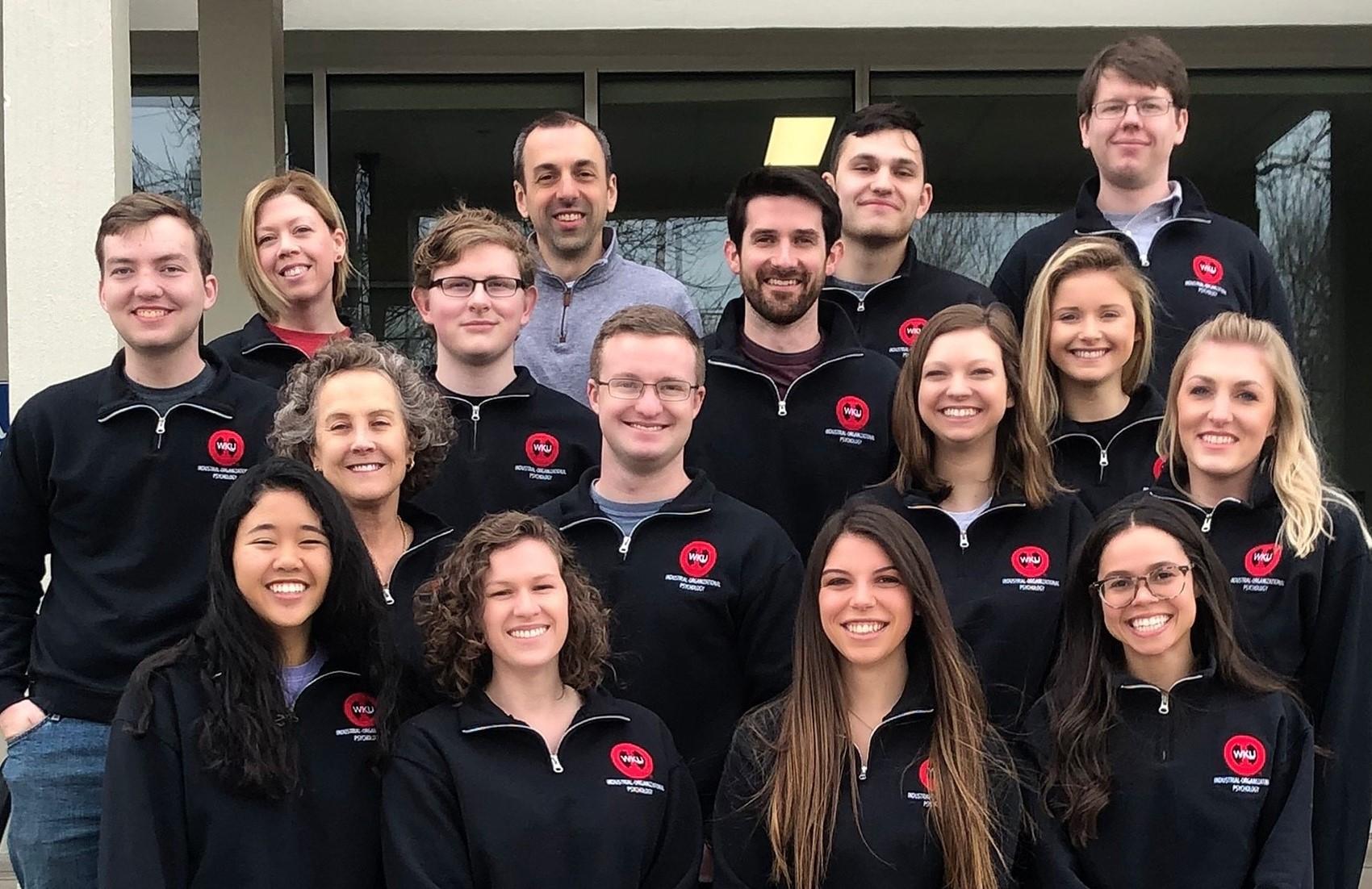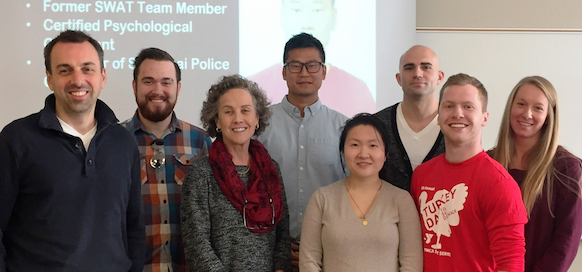M.S. in Psychology, Industrial/Organizational Concentration
Reach greater heights with a Master of Science in Psychology.
The Master of Science in Psychology prepares graduate students to pursue careers in business, research, or government settings, and/or to enter a doctoral program in psychology or a related field.
The Industrial/Organizational concentration of the Master of Science program in Psychology at WKU is a two-year graduate program designed for students seeking preparation as M.S. psychologists in business, industry, service organizations, consulting firms, or government agencies. The objective of the concentration is the development of marketable skills in the areas of test construction and validation, personnel selection and placement, performance appraisal, and training. Work motivation, job satisfaction, and organizational development techniques are also studied. The development of applied skills is achieved through the integration of practical experience and formal course work.
The I/O concentration adheres to a scientist-practitioner model of training. Students learn to evaluate and apply theory and research. Students are successful at gaining employment within the field of Industrial/Organizational Psychology upon graduation (e.g., human resources; people analytics; talent acquisition; organizational development and effectiveness, etc.).

- Dr. Katrina Burch, Program Coordinator
- (270) 745-3918
- katrina.burch@wku.edu
Kelly Thompson Hall 1031
Western Kentucky University
Bowling Green, KY 42101
- (270) 745-3918
- psychsciences@wku.edu
Western Kentucky University
Kelly Thompson Hall 1039
Bowling Green, KY 42101
The required courses for the I/O concentration are arranged below by the semester in which the course is typically offered/taken. For some courses, students are required to enroll in sections specifically designated for the I/O concentration. A total of 42 credit hours (i.e., 33 hours of course work, 3 internship credits (or approved substitution), and 6 thesis credits), as specified below, are required. Students are not permitted to walk in the graduation ceremony without having completed a thesis. Grades lower than "B" may not be used to satisfy requirements for courses in the I/O sequence (i.e., PSYS 570, PSYS 571, PSYS 572, PSYS 670, and PSYS 673).
Fall: First Semester
- PSYS 570 Job Analysis and Compensation: This course provides an introduction to job analysis, job evaluation, compensation and benefits. The course acquaints the students with different methods and techniques of job analysis used in a variety of personnel applications. Compensation and benefits are topics many of our graduates have found to be relevant to their human resource management jobs.
- PSYS 513 Correlation and Regression Analysis: The focus of this course is to learn about advanced analysis techniques appropriate to psychological research, with an emphasis on regression analysis, partial correlation, moderated multiple regression, and analysis of covariance.
- PSYS 518 Statistics and Psychometric Theory: This course focuses on statistical techniques related to reliability and validity assessment, test construction, and measurement theory.
Spring: Second Semester
- PSYS 571 Personnel Psychology: This course focuses on employee selection procedures with an emphasis on performance appraisal, testing, criterion development, and validation. There is direct involvement in data analysis and typically in the collection of data as well.
- PSYS 572 Organizational Psychology: This course covers theories of motivation, leadership, job satisfaction, organization theory, and organizational development. There is an emphasis on organizational skills that employers/graduates may find useful (e.g., behavioral improvement programs utilizing goal-setting and feedback).
- PSYS 510 Advanced Research Methods in Psychology: In this course, students examine methodological concepts and issues in the conduct of psychological research. Students who excel in this class may be given the opportunity to serve as a laboratory instructor for the undergraduate research methods course in their second year.
- PSYS 512 Analysis of Variance: In this course, students will examine the theory behind and application of between- and within-subjects designs, mixed designs, and other data analytic techniques with an emphasis on analysis of variance.
Summer: Following First Year
Typically students take this time to gain practical experience with an internship. An internship is not required, but does allow the student to earn three to six hours of internship course credit, as well as experience in the real world. An internship is highly recommended. Those students who do not participate in an internship and those students who earn only three credit hours for their internship must complete additional course work to meet the hours required for completion of the program. One option for doing this is to take a class or classes during the summer sessions. However, there typically are very few appropriate graduate-level courses offered at WKU during the summer term. Students completing an internship will enroll in PSYS 579 Internship in I/O Psychology.
Fall: Third Semester
- PSYS 581 Professional Issues and Ethics in Psychological Science: The focus of this course is to discuss ethics, legal issues, current professional issues (e.g., confidentiality, areas of competency), and methodological issues, including organizational assessment and feedback techniques.
- PSYS 673 Advanced Training in Business and Industry: This course focuses on conducting training needs analysis; designing, developing, and implementing training programs (technical and managerial); and evaluating the effectiveness of training programs.
- PSYS 599 Thesis Research: The I/O faculty and students meet weekly for colloquium presentations of individual research. First-year and second-year students are required to attend. Typically faculty will present first, followed by second-year student thesis proposal presentations. Students work with their thesis chair and committee in preparing the proposal. Any student that does not have his/her thesis proposal ready to go to committee by the end of the Fall semester (as confirmed by the committee chair) may have his/her assistantship terminated for the Spring semester.
Spring: Fourth Semester
- PSYS 670 Equal Employment Opportunity, the Law, and Ethical Considerations: This course covers issues relevant to providing equal employment opportunity, the Uniform Guidelines regarding selection practices, a review of the relevant major court decisions and their implications for the personnel specialist, and professional and ethical considerations in the practice of I/O psychology.
- PSYS 552 Advanced Social Psychology (or Elective): Advanced Social Psychology covers interpersonal perception, group dynamics, intergroup relations, attitude formation and change, social influence, gender issues, and other topics relevant for I/O psychologists.
- PSYS 599 Thesis Research: The other three hours of thesis credit are usually taken during this semester, as students should be completing their research and preparing for their thesis defense.
Industrial/Organizational Psychology Concentration Internship
We strongly encourage our students to participate in an internship the summer following the first year of courses in the Industrial/Organizational concentration. Three hours of credit may be earned for the internship (i.e., PSYS 579: Internship in I/O Psychology). To receive the three hours of internship credit, a minimum of 20 hours per week is required in an organizational setting. However, depending on the duration of the internship, this may be negotiable. The internship experience (and grade assignment) must be supervised by a faculty member. The student must make supervision arrangements with an appropriate faculty member prior to beginning the internship. The faculty member and student will negotiate the specific requirements for the internship. Such requirements typically include keeping a daily task journal documenting involvement in organizational projects, submitting a bi-weekly written report, and writing a fairly comprehensive technical report.
The technical report should include how the student obtained their position, what the internship entailed, who the student worked for in the organization, a description of the conditions under which the student worked, and a detailed description of the projects with which the student was involved. This project description should include the organizational objectives for the project, tasks involved in the project, and any work products of the project, as well as the status of the project upon completion of the internship. A semi-formal presentation is also required. This presentation will be made in a colloquium for the I/O graduate students and faculty.
News and Updates:
- University Distinguished Professor Emerita, Dr. Betsy Shoenfelt, has been named a Fellow in the American Psychological Association (APA)! Dr. Shoenfelt has also been named as ombudsperson to the Society for Industrial and Organizational Psycholgoy (SIOP)!
- Dr. Katrina Burch's research was recently featured on Department 12, a popular I/O psychology podcast, as well as on WKU News!
- Dr. Reagan Brown received a grant though the Affordable Textbook Initiative, with the goal of making course materials available to students at no cost!
Some of the links on this page may require additional software to view.



